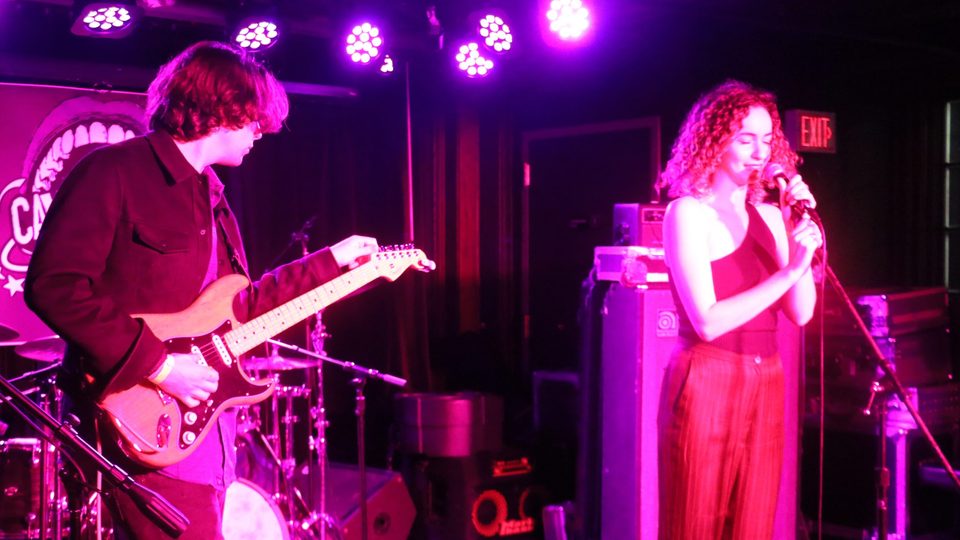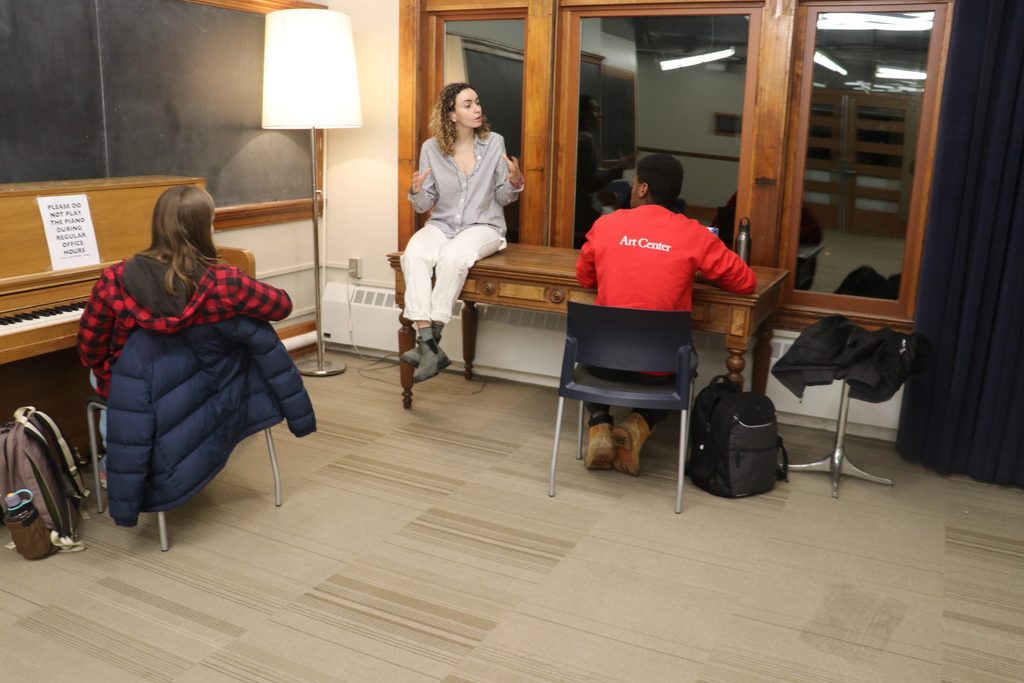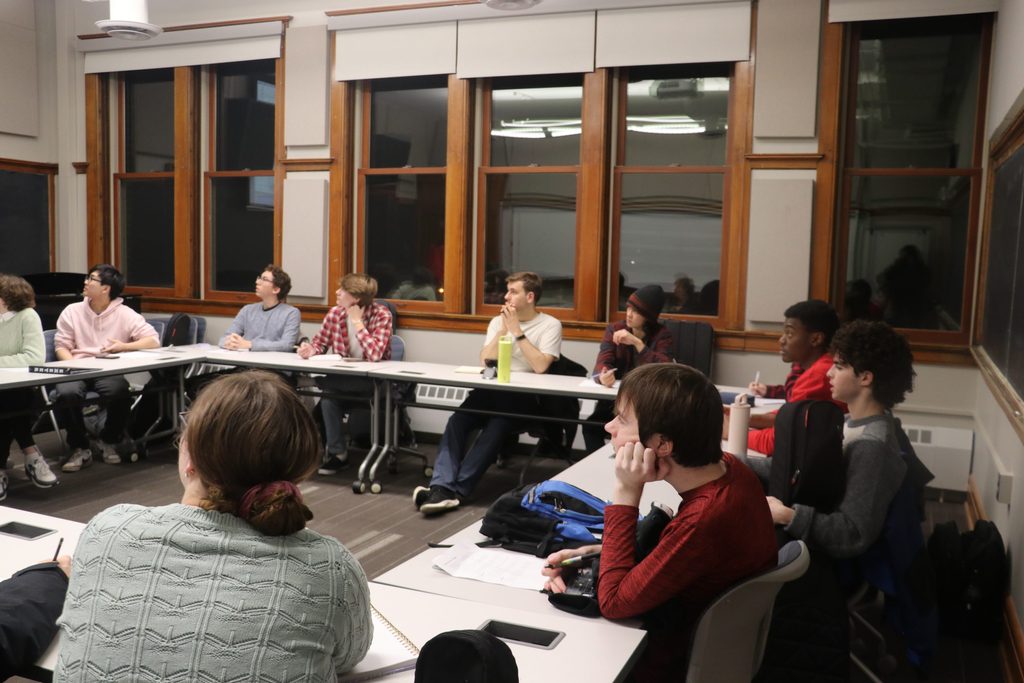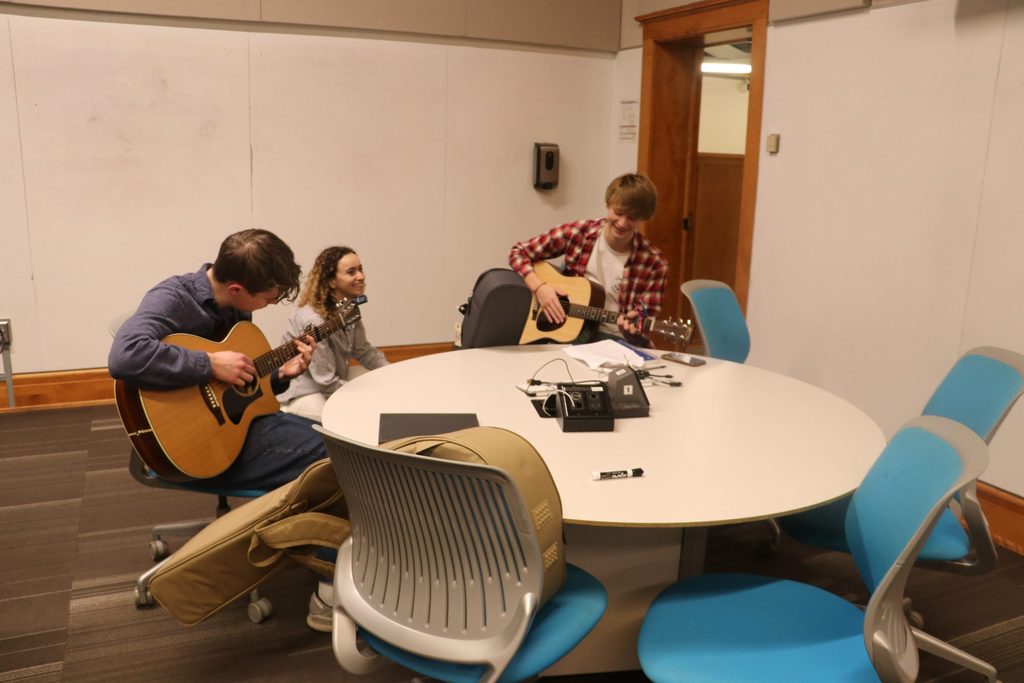Rebecca McCartney ’21 inspires aspiring songwriters
Students learn from recent grad about songwriting and a career in the performing arts.

From January 24 to 27, singer-songwriter Rebecca McCartney ’21 returned to Carleton, leading a multi-day songwriting workshop, hosting a CarlsChat session, and performing for Carleton’s first-ever CaveFest.
McCartney, a self-described freelance musician and systems change advocate, was motivated to come back to Carleton in an effort to fill the gap in representation of full-time artists she experienced as a student. As a music student, McCartney “didn’t know anyone trying to pursue the full-time artist career I was interested in. I didn’t really know who to talk to.” Because of her own experience, McCartney was “inclined to open myself up to any student who might find me helpful. I want to be a resource in any way.”
As a recent grad, McCartney fostered connections she had forged with students still attending Carleton. In collaboration with those current students, McCartney created a plan to impart the knowledge from her real-world experiences to the community that had prepared her for her music career. This idea crystallized over a few months as McCartney worked with Grace Bassekle ’25 to coordinate and gauge interest in a songwriting workshop.
McCartney described her return as “a privilege and pleasure,” sharing how she felt honored to “get to come back to share something that has become my whole career.” At Carleton, McCartney had explored her interest in a music career by “working in different parts of music: performing shows at The Cave with my band, starting to write songs, and singing in the choir and chamber choir and kind of all over.”

The music department was “really hopeful that I would listen to my gut and interests and go for it,” said McCartney. Describing the whole music department as “there to hold my hand,” McCartney highlighted Professor and Chair of Music Andy Flory in particular as an encouraging mentor during her time at Carleton. “He would come up after every concert and say, ‘You know you have to try to do this. You have to try. You have to do this,’” she recounted. Never pushed into something she wasn’t already interested in, McCartney explained that the faculty at Carleton who surrounded her formed a “core team of people trying to get me to give my dreams a shot.”
Since then, “all of those disparate paths of music have solidified in my core, my career as a singer-songwriter,” said McCartney. “Getting to come back to campus and share the way things have grown for me since I’ve left is very special.”
McCartney found her return to be a very positive experience as she was “welcomed back with incredibly open arms.” Smiling as she spoke, McCartney admitted that she “could never have anticipated how good it would feel to come back here and just walk around.” She enjoyed the juxtaposition between “getting to be a student again” and “bringing back something new.”
“I want to do this again and again and again,” said McCartney. “I’ve been beaming.”
Despite graduating just three years prior, with an ever-changing student body at Carleton, the majority of people McCartney met were new to her. McCartney described the new students she met as “carrying such a beautiful, open spirit about them, especially in this world of songwriting that can be vulnerable and hard.” While containing new members, the student body still maintained the same remarkable energy that McCartney remembered — “I forget how special, zany, fun, wacky, and unique this school is.”

The songwriting workshop was conducted over two three-hour sessions on Thursday, January 25 and Friday, January 26, culminating in a share-out session on Saturday, January 27. Over a dozen students gathered in the KRLX studio to learn from McCartney. What began as a group with “no sense of shared community” became a place for vulnerability over a very short period of time. By Saturday, McCartney found herself in a room of “changed people.” There was power even in the simple act of bringing these songwriters together, as a community formed that equipped those present with “a support network amidst themselves… to continue developing new stuff over the coming years.” McCartney hopes this newly created community will “foster a stronger energy toward songwriting at Carleton.”
McCartney was heartened by how quickly students were able to “get through this cloud of shame of being a songwriter,” explaining that vulnerability throughout the writing process is an essential skill for a songwriter. Part of the process of excellent songwriting is writing bad songs, McCartney asserted: “Make bad stuff so you can start to make better stuff.” Illustrating this concept with a metaphor, McCartney said, “You need to let the tap run so you can let out the early bad stuff so you can eventually get to a place of clarity… it’s the only way to grow.”
In her workshop, McCartney encouraged students to “let go of their expectations of what the right kind of song looks like and sounds like.” In the journey to creating something honest and truthful, McCartney stressed the importance of accessing one’s own ideas, “catching them as they come” and then “squeezing those [ideas] out into more full songs.”
“The skill I was really trying to get them to hone in on was to listen to their gut and build a consistent practice that puts them in a good creative headspace,” said McCartney.

Other practices McCartney recommended students adopt included “learning how to hustle while you’re in college” and “internalizing the idea that no one is going to do it for you.” The theme of vulnerability came up again as she urged students to “learn how to put yourself out there. Do it in ways that feel comfortable, and then ways that feel like they are pushing you.” She assured aspiring musicians that “there are people out there who want to hear your music,” it’s just a matter of reaching the right audience.
Following the share-out session, McCartney performed at The Cave just as she used to do as a student with her band, Small Boat. Reminiscing about her previous performances at The Cave, McCartney appreciated the opportunity to “bring back the skills I started sharpening at Carleton in a much more professional way.”
The unique venue of The Cave offered McCartney a more intimate atmosphere than she is used to when performing in New York. She considered herself lucky to get to perform for “these students who are amazing listeners,” particularly valuing how, in her experience, Carls are “willing to be mellow and present with whatever music is on stage.”
Looking to the future, McCartney would “love to keep coming back” in any capacity to support aspiring musicians at Carleton. She shared how the songwriting workshop got “incredible feedback,” with many students expressing hopes for similar events in the future. For McCartney, her return to Carleton “feels like it could be the start of a recurring long-term pattern” of translating the freelance artist life to workshops and cultivating the songwriting community at Carleton.